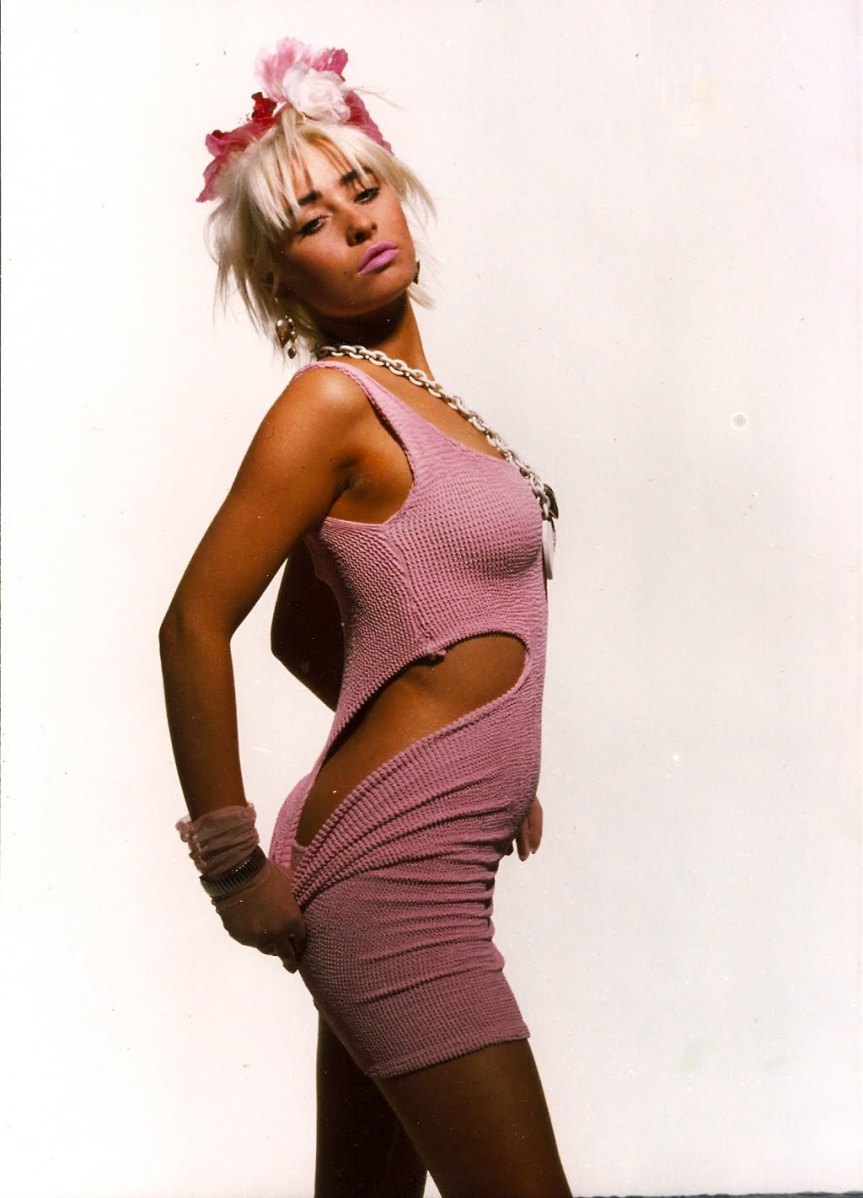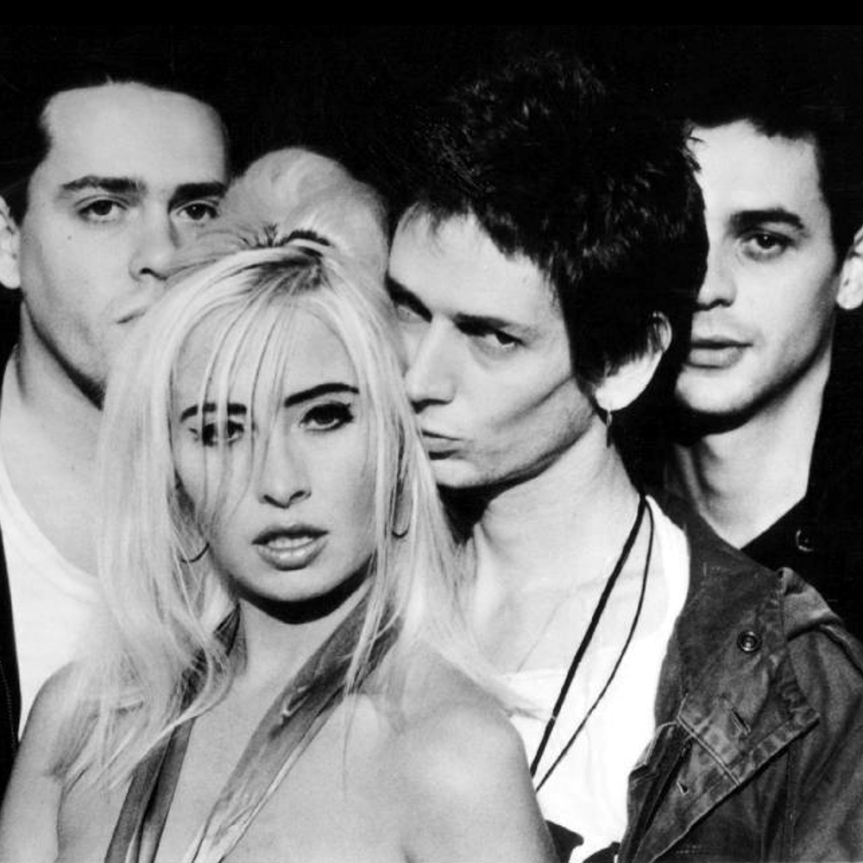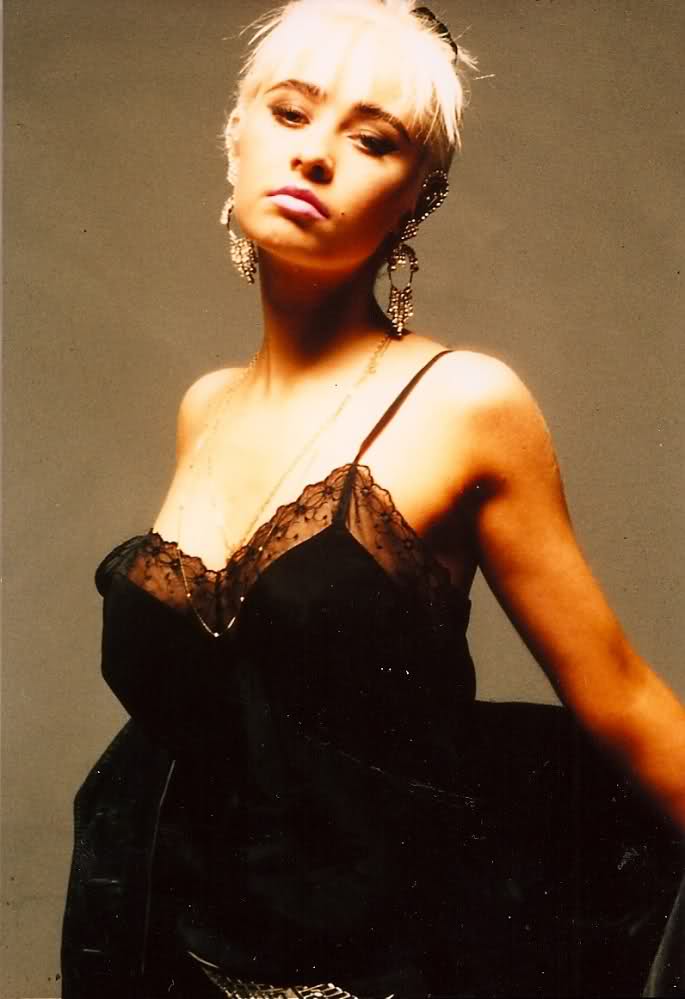
Ahh, Transvision Vamp… massively popular for a few years, then ridiculed by idiots for the next couple of decades, until people realised that here was a band that were the perfect collision of rock ‘n’ roll, pop culture, sex, kitsch and cool. If any group feels like The Reprobate distilled into musical form, then this is it.
The band were fronted by Wendy James – our last great pop star, a sultry, teasing, pouting, self-aware role model for teen rebels who barely hid her contempt for Radio 1 morons or her ambition, and seemed to encapsulate the post-80s feminism emerging at the time, no longer bitter and angry, but confident, sexy and full of piss and vinegar, taking no prisoners and no bullshit. No wonder their record label crushed the life out of them at the first opportunity, refusing to release their third album in the UK, despite its predecessor hitting the number one spot.
These two reissues are a great reminder of just what a vital FastPop force TV were in those pre-grunge, pre-rave days. Sounding a little less Eighties than you might think (production wise at least), the two albums, now expanded into double CD sets, are vital, lively explosions of pop genius, rammed with infectiously catchy tunes from Nick Christian Sayer, guitar riffs, pop culture references and a fin-de-siecle mentality where the end of the 20th century, and the hopes for the 21st, collide. With references to Marilyn Monroe, William Burroughs, Andy Warhol, 2000AD, MTV, Che Guevara, Elvis Presley, and LSD scattered throughout their oeuvre, the band were the perfect end of the century pop entity.

1988’s Pop Art, if the title doesn’t make it obvious enough, sets out its stall on opener Trash City, a sci-fi, comic book low culture celebration that is very much in the spirit of Pop Will Eat Itself at their referential best. The track is the opening salvo in one of the best side one’s ever recorded, as the band tear through song after song. There’s breakthrough single I Want Your Love, the fantastic Revolution Baby, the blasting Psychosonic Cindy and the hippy chill out of Sister Moon. Incredible stuff!
The second side takes its foot off the pedal slightly. The cover of Holly and the Italians’ Tell That Girl to Shut Up is a punk-pop masterpiece, but Wild Star and Alan Moore-referencing Hanging Out with Halo Jones are the two weakest tracks on the album – not terrible by any means, but lacking the energy and the effortlessness of the rest of the album.
Still, two out of nine ain’t bad, and the album finishes with the cynical Andy Warhol’s Dead and the epic, gloriously seedy Sex Kick – a potent ‘fuck you’ to the ending decade of sexual repression and a heady mix of violence, kink, lust, Frankie Goes to Hollywood and guitar riffs. Magnificent.
The new material starts on disc one, with Andy Kershaw session recordings of Trash City, Andy Warhol’s Dead, Sex Kick and non-album track Sweet Thing. These are a lot rawer, less poptastic and more rocking than the album versions – no bad thing, though it makes you wish that room had been found here for the BBC In Concert recording of the band as well, another blasting performance currently to be found only in the outer limits of the internet. Trash City comes complete with Burroughs samples, Andy Warhol’s Dead is laden with jangly guitars, Sex Kick offers more of everything (including Wendy’s extraordinary agony/ecstasy orgasm howl) and the lovely Sweet Thing points the way towards the Sixties pop influences on second album Velveteen.

Disc two offers the unreleased (on album) stuff, and is a mixed bag. B-side track Vid Kid Vamp is a collision of Trash City and Seventies glam, in what feels oddly like an unfinished prototype (lyrically at least) that is nonetheless entertaining. Revolution Baby B-side No It U Lover is a pointless and very Eighties remix of the song that is really horrible. God Save the Royalties is a track played backwards, which I guess would have caused some American politicians to have kittens. There are alternative 12 inch mixes of Revolution Baby and Tell That Girl to Shut Up that, truthfully, are really not improvements. The Knuckle Duster mix of Tell That Girl… is a simultaneously beefed up and stripped down, mostly instrumental version of the track that is especially pointless, and rather sums up everything wrong with 12 mixes from non-dance acts of the time. Only the Ciao Portobello Mix of Sex Kick, stripping back the guitars to give the song a bass-led, electro, darker edge really works in these remixes.
Rather better are Sweet Thing (here sounding similar to the Kershaw session), the chirpy Evolution Evie (included in both acoustic and electric versions, and reminiscent of Halo Jones), the punky Oh Yeah, and the bouncy, defiant Long Lonely Weekend, all of which could’ve been album tracks. Honey Honey is a charming acoustic love song and Walk On By (not the Bacharach/David song!) almost becomes a power ballad, showing that the band were far from one-trick ponies.

Velveteen was Transvision’s Vamp’s finest hour – an album that hit Number One and stayed on the chart for 26 weeks. And rightly so, because it’s a magnificent album that hits the ground running with one of the finest pop songs ever recorded, Baby I Don’t Care – a glorious, flawless song of romantic indifference that even survives the indignity of being murdered in a lamentable cover by some soap opera halfwit several years ago. The original TV version is genuinely fantastic – pop as it should be, fast, rocking, shouty and sticking two fingers up at polite society.
Oddly, this edition of the album features I Want Your Love – a great, pivotal track, but one lifted from Pop Art and most definitely not part of the original Velveteen release. It’s inclusion here, while perhaps welcome to people who haven’t bought Pop Art, is frankly baffling.
Things get back on the official track with The Only One, another bouncy, effortlessly catchy uptempo tune, that, alongside Landslide of Love, has a Sixties vibe. Landslide… does it more obviously, channelling girl groups of the era flawlessly.
Falling for a Goldmine takes the foot off the pedal, and is one of the weaker songs on the album, though as a moody, atmospheric ballad, it works well. Down on You livens things up again, but maintains the darker feel that dominates the album from hereon in. The idea of putting the upbeat pop tunes upfront is a smart one – the album is allowed to develop its style organically, without uncomfortable switches in tone, and from now on, it’s a much moodier affair. Side One closer Song to the Stars is a slight, but effectively minimal country song, while Side Two opens with the sleazy low-fi garage punk number Kiss Their Sons – a great little number that shows how the band had developed their sound from the first album. Born to be Sold, sadly, is the weakest song on the album, despite a surfeit of pop culture namechecks, and probably a bad choice for the final single release – it just lacks the dynamic sound needed to work.

Pay the Ghosts, on the other had, is a belting, driving and sinister foot stomper, with a mix of wild guitar soloing and rockabilly twanging, as James’ breathy vocals reach a crescendo of sneering contempt. Marvellous stuff! As indeed is the lugubrious, stripped back ballad Bad Valentine, where Wendy groans “I’m so bad, bad, bad all the time” in a way guaranteed to send shivers down your back.
The album finishes with the title track, a near-ten minute epic that runs through several movements (really!) and is an impressively moody, creepily sinister and cinematic tale of sex and seduction that is almost operatic in its approach. It’s a pretty astonishing piece of work that builds to a suitably frenetic climax that is admirable in its sheer audacity.
Disc Two, as with Pop Art‘s bonus disc, is a mix of B-sides and remixes (though thankfully fewer of the latter), and again is a mixed bag. The Abigail’s Party Mix of Baby I Don’t Care teases with the idea that it might be an effective extension before tossing in a lot of Eighties gubbins to mess it up and emasculate the song. The ‘extended versions’ of The Only One and Landslide of Love are better, in the sense that they remain more faithful to the original, but it does feel like needless padding. When you’ve got it so right the first time round, why mess with it?
Luckily, there are better things on offer here, including a demo version of Sex Kick (less polished than the album version, less crunching than the Kershaw version but still a solid rendition) and several B-side songs. Time for Change is another bouncy, Sixties-inspired, upbeat number, while Strings of my Heart has a rockier feel – both tracks, notably, lacking the polish of the album, which gives them a rawer, live feel – not a bad thing.
Saturn 5, also called a demo version, comes across like a Pop Art outtake (both musically and lyrically), and while no great loss from that album, it’s a welcome inclusion here. The Mystery Song, on the other hand, is a sweet acoustic number that reveals Wendy to be a better singer than people gave her credit for.
Love Me is a curio – an instrumental, off-kilter number that seems influenced by left-field alt rock like Devo. I could see this fitting in nicely on Mitchell Froom’s Cafe Flesh soundtrack! W11 Blues does what the title promises – a stomping tale of dodgy characters and dodgy deals in Notting Hill.

In fact, the B-sides from this album show a TV up for experimenting with their sound. Hardtime is electro pop with subdued vocals and soaring guitar breaks that is nice try, albeit one that doesn’t really work. He’s the Only One for Me is closer to traditional Transvision sound, but stripped down and made more rock ‘n’ roll – it’s arguably the closest in spirit to Wendy James’ recent material. Kiss Me is a pure rock, with minimal vocals and lots of guitar riffing.
The album ends with two live tracks – Down on You, oddly, seems less dark and moody here than on the studio version, but their version of the Rolling Stones’ The Last Time is suitably rough, ready and rocking.
Taken as a whole, it’s impressive how these albums still hold up. The production is dated, but not as dated as much 1980s stuff, and the tracks on the main releases are incredibly, consistently good. As part – possibly on the edge of – of a late Eighties/early Nineties, female-fronted music scene that also included The Darling Buds, The Primitives, Voice of the Beehive and all the way through to Alisha’s Attic and Shampoo, Transvision Vamp arguably represented the final point – to date – that pop music in the UK had any value, when it was still tied to rock ‘n’ roll and rebellion, rather than the bland offerings of Britpop or the polished to the point where it was safe for small children output of Simon Cowell and his bastard associates. It’s no surprise that all those bands were rapidly abandoned by a music business and radio DJs who like things safe and simple.
As Wendy says during the introduction to the final song on these two albums, “I can’t bear it you know, you spend three, four years doing something you really care about and some tossy journalist says ‘uh, that’s shit, fuck off and die’.” Transvision Vamp may have been ground into the dirt by said tossy journalists (and equally tossy DJs and record labels) but these two great albums show that the naysayers were wrong, as usual.
Now, can we have a special edition of Little Magnets vs The Bubble of Babble please?
DAVID FLINT
BUY POP ART (UK)
BUY VELVETEEN (UK)
Advertisements Share this:





